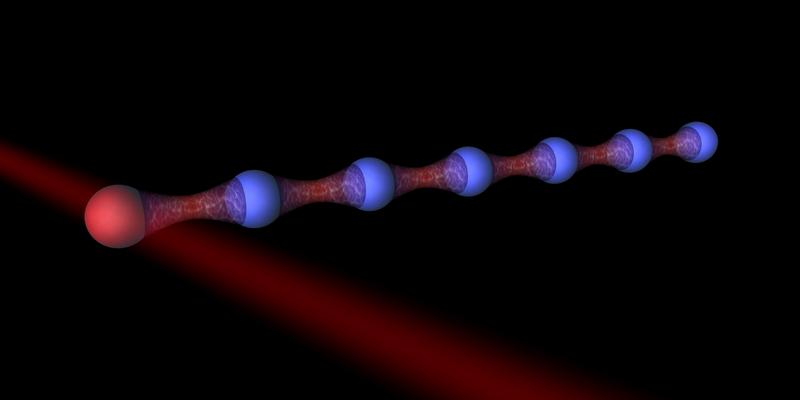

Illustration of an ion trap quantum simulator including the auxiliary particle (red)
(c) Piet Schmidt/PTB
Quantum technology has the potential to enable revolutionary technological applications. However, conventional computers lack the power to calculate the properties of complex quantum systems.
Phenomena such as quantum superposition or entanglement cause an exponential increase in operations that would take modern supercomputers several years to complete.
Quantum simulation can solve this problem. Since quantum simulators are quantum systems as well, they are able to use the same exponential complexity for operations, therefore determining the properties of other quantum systems efficiently.
Nevertheless, generating and controlling quantum states relevant for simulations is still difficult. A team of physicists led by Hendrik Weimer from the Institute of Theoretical Physics at Leibniz University Hannover has developed a new approach for realising suitable ground states more efficiently.
In the current issue of the scientific magazine “Science Advances”, the researchers introduce a general cooling system for strongly correlated quantum systems.
Typically, interesting quantum states in strongly correlated systems can be found at extremely low temperatures close to absolute zero. The cooling process – especially in multi-particle quantum systems – is time-consuming, difficult to control and requires significant resources.
In their new approach, Weimer and his team connected the quantum simulator to an auxiliary particle so that energy can be exchanged between them. Controlling and extracting energy from a single auxiliary particle – therefore cooling it – is significantly easer.
The loss of energy is compensated via the connected quantum simulator, causing it to cool even further. Via dissipative cooling, the researchers were able to lower the temperatures of the quantum simulator to as low as a few nanokelvin.
“The main advantage of our approach is that instead of an entire system, we only have to cool a single particle”, explains Hendrik Weimer. Together with his team it was possible to demonstrate that this is both efficient and feasible using relatively modest technical efforts.
This enables researchers to prepare and control quantum simulators more easily, especially for strongly correlated systems. For example, fascinating materials such as high-temperature superconductors could be calculated more easily via quantum simulators.
The publication originated from the collaborative research centre DQ-mat and received funding from the Volkswagen Foundation. Within the scope of the collaborative research centre DQ-mat, researchers from Leibniz University Hannover, Physikalisch-Technische Bundesanstalt (PTB), and the Center of Applied Space Technology and Microgravity in Bremen investigate how complex quantum systems can be controlled in order to use them in Metrology.
Original article
Initialization of Quantum Simulators by Sympathetic Cooling
Meghana Raghunandan, Fabian Wolf, Christian Ospelkaus, Piet O. Schmidt and Hendrik Weimer
Science Advances 6, eaaw9268 (2020).
https://dx.doi.org/10.1126/sciadv.aaw9268
Note to editors:
For further information, please contact Dr. Hendrik Weimer, Institute of Theoretical Physics, Leibniz University Hannover (Tel. +49 511 762 17344, Email hweimer@itp.uni-hannover.de).












